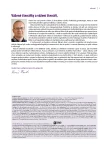-
Medical journals
- Career
Fertility-preserving treatment in women with endometrial cancer
Authors: Pavla Svobodová
Authors‘ workplace: Gynekologicko-porodnická klinika 3. LF UK a FN KV, Praha
Published in: Prakt Gyn 2016; 20(1): 19-22
Category: Oncogynecology: Review Article
Overview
The diagnosis of endometrial carcinoma in young women of childbearing age is rare, but the incidence in growing. Fertility-preserving therapy of endometrial carcinoma could be considered in patients with a histological diagnosis of grade 1 stage IA endometrial carcinoma without myometrial invasion who wish to preserve their fertility, are willing to accept intensive treatment, close follow-up and risk of unstaged disease. Conservative treatment is based on 6 months medical treatment with high-dose oral progestins. Response rate is referred between 60 and 80 %, recurrence rate 25–40 %; live birth rate around 30 %. Patients should be informed about real risk of recurrence and the need of future hysterectomy.
Key words:
endometrial carcinoma – fertility-saving treatment
Sources
1. Novotvary 2011. ÚZIS ČR: Praha. ISBN 978–80–7472–097–0. Dostupné z WWW: <http://www.uzis.cz/publikace/novotvary-2011>.
2. Dostupné z WWW:
. 3. Lee NK, Cheung MK, Shin JY et al. Prognostic factors for uterine cancer in reproductive-age women. Obstet Gynecol 2007; 109(3): 655–662.
4. Creasman WT, Odicino F, Maisonneuve P et al. Carcinoma of the corpus uteri. J Epidemiol Biostat 2001; 6(1): 47–86.
5. Crissman JD, Azoury RS, Barnes AE et al. Endometrial carcinoma in women 40 years of age or younger. Obstet Gynecol 1981; 57(6): 699–704.
6. Rodolakis A, Biliatis I, Morice P et al. European Society of Gynecologic Oncology Task Force for Fertility Preservation. Clinical recommendations for fertility-sparing management in young endometrial cancer patients. Int J Gynecol Cancer 2015; 25(7): 1258–1265.
7. Ushijima K, Yahata H, Yoshikawa H et al. Multicenter phase II study of fertility-sparing treatment with medroxyprogesterone acetate for endometrial carcinoma and atypical hyperplasia in young women. J Clin Oncol 2007; 25(19): 2798–2803.
8. Zaino RJ, Kurman R, Herbold D et al. The significance of squamous differentiation in endometrial carcinoma: data form a Gynecologic Oncology Group study. Cancer 1991; 68(10): 2293–2302.
9. Kinkel K, Kaji Y , Yu KK et al. Radiologic staging in patients with EC: a meta-analysis. Radiology 1999; 212(3): 711–718.
10. Signorelli M, Caspani G, Bonazzi C et al. Fertility-sparing treatment in young women with EC or atypical complex hyperplasia: a prospective single-institution experience of 21 cases. BJOG 2009; 116(1): 114–118.
11. Laurelli G, Di Vagno G, Scaffa C et al. Conservative treatment of early EC: preliminary results of a pilot study. Gynecol Oncol 2011; 120(1): 43–46.
12. Yamazawa K, Hirai M, Fujito A et al. Fertility-preserving treatment with progestin, and pathological criteria to predict responses, in young women with endometrial cancer. Hum Reprod 2007; 22(7): 1953–1958.
13. Kim MK, Seong SJ, LeeTS et al. Treatment with medroxyprogesterone acetate plus levonorgestrel-releasing intrauterine system for early stage EC in young women: single-arm, prospective multicenter study: Korean gynecologic oncology group (KGOG 2009). Jpn J Clin Oncol 2012; 42(12): 1215–1218.
14. Koskas M, Uzna J, Luton D et al. Prognostic factors of oncologic and reproductive outcomes in fertility-sparing management of endometrial atypical hyperplasia and adenocarcinoma: systematic review and meta-analysis. Fertil Steril 2014; 101(3): 785–794.
15. Kim MK, Seong SJ, Song T et al. Comparison of dilation & curettage and endometrial aspiration biopsy accuracy in patiens treated with high-dose oral progestin plus levonorgestrel intrauterine system for early-stage endometrial cancer. Gynecol Oncol 2013; 130(3): 470–473.
16. Gallos ID, Yap J, Rajkowa M et al. Regression, relapse, and live birth rates with fertility sparing therapy for EC and atypical complex endometrial hyperplasia: a systematic review and metaanalysis. Am J Obstet Gynecol 2012; 207(4): 266.e1–266.e12. Dostupné z DOI: <http://dx.doi.org/10.1016/j.ajog.2012.08.011>.
17. Park JY, Kim DY, Kim JH et al. Long-term oncologic outcomes after fertility-sparing management using oral progestins for young women with EC (KGOG 2002). Eur J Cancer 2013; 49(4): 868–874.
18. Gunderson CC, Fader AN, Carson KA et al. Oncologic and reproductive outcomes with progestin therapy in women with endometrial hyperplasia and grade 1 adenocarcinoma: a systematic review. Gynecol Oncol 2012; 125(2): 477–482.
19. Colombo N, Creutzberg C, Amant F et al. ESMO-ESGO-ESTRO consensus conference on endometrial cancer: diagnosis, treatment and follow-up. Ann Oncol 2016; 27(1): 16–41.
20. Park JY, Seong SJ, Kim TJ et al. Pregnancy outcomes after fertility-sparing management in young women with early EC. Obstet Gynecol 2013. 121(1): 136–142.
21. De Marzi P, Bergamini A, Luchini S et al. Hysteroscopic resection in fertility-sparing surgery for atypical hyperplasia and endometrial cancer: safety and efficacy. J Minim Invasive Gynecol 2015; 22(7): 1178–1182.
22. Mitsuhashi A, Sato Y, Kiyokawa T et al. Phase II study of medroxyprogesterone acetate plus metformin as a fertility-sparing treatment for atypical endometrial hyperplasia and endometrial cancer. Ann Oncol 2016; 27(2): 262–266.
Labels
Paediatric gynaecology Gynaecology and obstetrics Reproduction medicine
Article was published inPractical Gynecology

2016 Issue 1-
All articles in this issue
- Which is an adequate size of cone?
- Risk of thyroid cancer in women treated for infertility
- Fertility-preserving treatment in women with endometrial cancer
- Prevention of cancer in women – survey about using opportunities of prevention oncological diseases in women population
- Physiotherapy after breast surgery
- Implementation of the traditional Chinese medicine preparation into standard therapy of vulvovaginal discomfort
- Dysfunctional uterine bleeding in adolescents
- Myoinositol and its therapeutic possibilities
- Vasa praevia: incidence, diagnosis, recommendations
- Choline significance in nutritional supplementation in pregnant women
- Surgical solution of acute abdominal event in pregnancy: case report
- Practical Gynecology
- Journal archive
- Current issue
- Online only
- About the journal
Most read in this issue- Vasa praevia: incidence, diagnosis, recommendations
- Dysfunctional uterine bleeding in adolescents
- Which is an adequate size of cone?
- Physiotherapy after breast surgery
Login#ADS_BOTTOM_SCRIPTS#Forgotten passwordEnter the email address that you registered with. We will send you instructions on how to set a new password.
- Career

